Vada Pav is a savory and spicy soft dinner rolls or fluffy buns, referred to as Pav, stuffed with a fried batter coated potato dumpling fritter called Batata Vada and laced with spicy and sweet chutneys. It is a popular vegan street food snack eaten in Mumbai and rest of the Maharashtra state in Western India. This dish is filling, delish, full of flavors and has various textures!
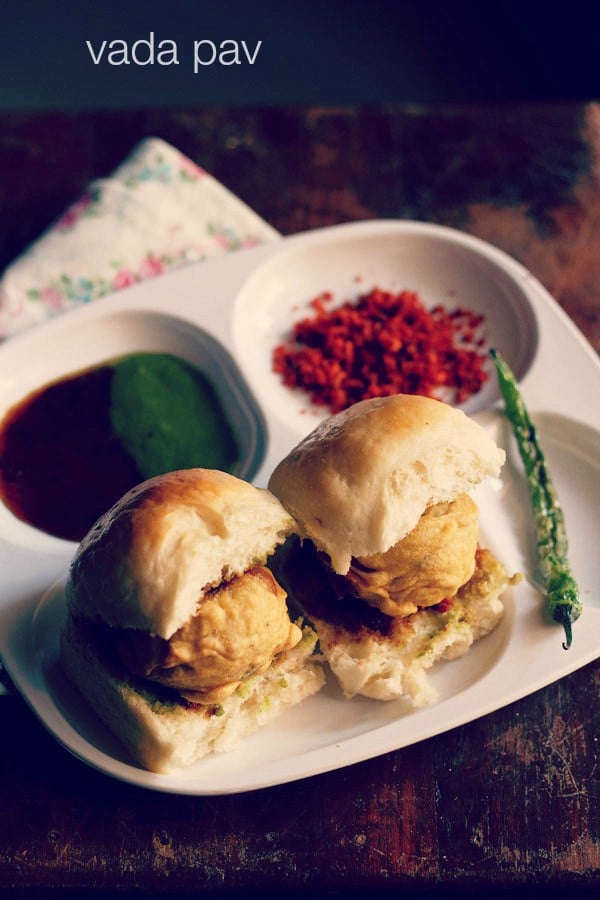
About Vada Pav
Vada Pav is sold in shops, outside of schools and colleges all over Mumbai because it is so popular and loved by street food lovers.
It is one of the most humble street foods in Mumbai, yet it is tasty and delicious. Vada pav basically has Batata Vada which is sandwiched between two slices of a pav (fluffy dinner roll) topped with sweet chutney, green chutney, and dry garlic chutney.
Batata vada are fried batter coated potato dumpling fritters. The batter is made with nutty gram flour (besan) and spices. The filling consist of savory, spiced mashed potatoes.
Batata means potato in Marathi language. While the term vada mostly means a fried fritter or a fried dumpling-like savory dish.
Throughout my childhood, I ate vada pav in many places in Mumbai and it was always so delicious! Even today I still make sure that I buy vada pav whenever I visit Mumbai. However, when I am craving vada pav and can’t get to Mumbai, so I make them at home.
Pav means a small loaf or bun of bread in Indian and is the same as dinner rolls. They are made with all purpose flour or whole wheat flour and can be bought from bakeries, super stores and sweet shops in India.
Vada pav can be eaten during any time of the day like breakfast, brunch, or in the evening as a snack. It goes very well with Indian chai, fried green chilies, and chutney like coriander chutney or mint chutney or green chutney or any chutney of your choice.
To make vada pav you need five elements:
- Pav – Fluffy dinner rolls or buns. Get the Pav Recipe here or buy from your favorite bakery.
- Batata vada – Fried potato stuffed fritter. I share detailed recipe below.
- Green Chutney – A piquant and spicy condiment made with coriander (cilantro) or mint and coriander leaves.
- Tamarind Chutney – This is a sweet and tangy chutney made with tamarind, jaggery and spices.
- Garlic Chutney – A spicy dry chutney made with garlic cloves and coconut.
How to Make Vada Pav
Make seriously awesome vada pav with my step-by-step guide! In this guide, I have shared how to make potato vada in detail. The green chutney and sweet chutney recipes are also in the recipe card below.
Make Potato Stuffing
1. Boil 2 large potatoes that weigh about 350 grams. Peel and then mash them with a fork in a bowl.
You can boil or steam the potatoes in a pan, Instant pot or stovetop pressure cooker adding water as needed.
Remember to drain the water very well from the boiled potatoes before you mash them. Set aside the potatoes to cool. When they become warm, peel and mash them with a fork or a potato masher.
Also crush 6 to 7 small/medium-sized garlic cloves and 1 to 2 green chilies in a mortar pestle.
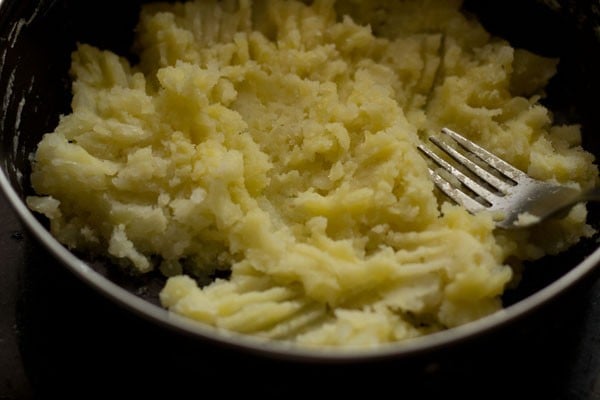
2. Heat 2 to 3 teaspoons of oil in a small pan. Add ½ a teaspoon of mustard seeds and crackle them.
Then add 7 to 8 curry leaves and a pinch of asafoetida (hing). Stir and sauté for about 5 seconds on low heat.
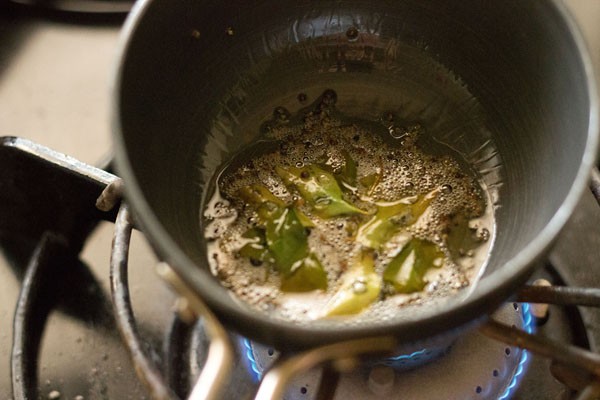
3. Add the crushed garlic cloves and green chilies mixture to the pan. Add ⅛ teaspoon of turmeric powder (about 2 to 3 pinches).
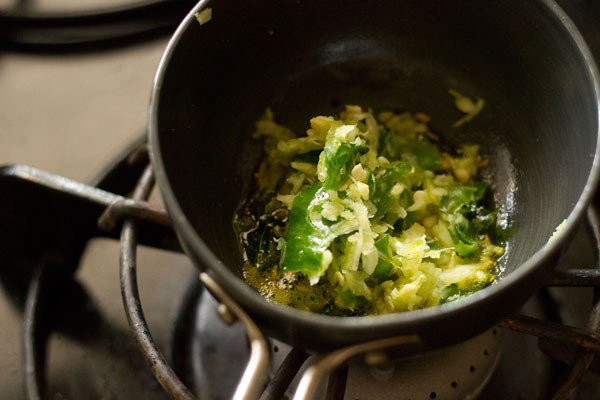
4. Stir on a low heat for some seconds or until the raw aroma of garlic goes away.
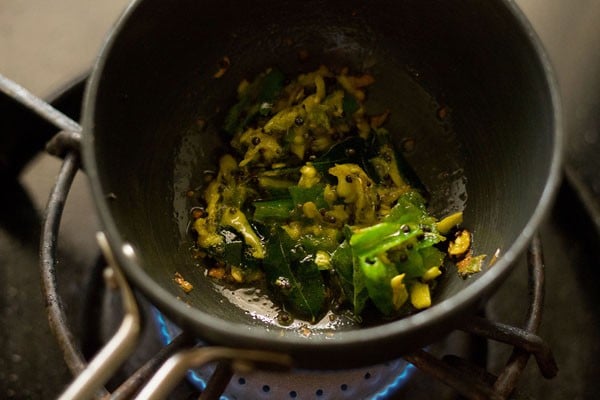
5. Pour this tempering mixture together with the oil to the mashed potatoes.
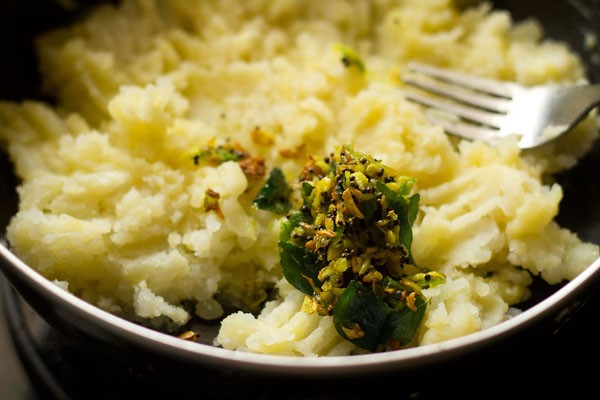
6. Add 1 to 2 tablespoons of chopped coriander leaves (cilantro) and salt as required.
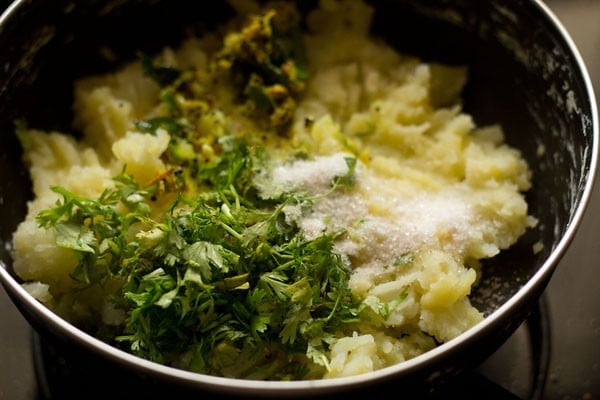
7. Mix everything well with a spoon. Do a taste test and if needed, add more salt.
Then make small to medium balls from the mashed potato mixture. Flatten these balls a bit. Cover and keep aside.
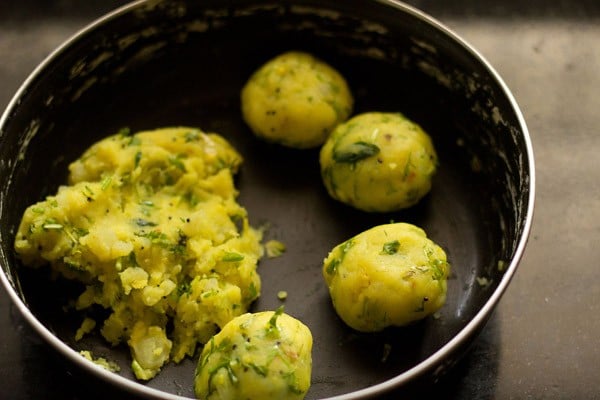
Make Batter
8. In another bowl, make a smooth batter from 1 to 1.25 cups besan (gram flour), ⅛ teaspoon turmeric powder (about 2 to 3 pinches), a pinch of asafoetida (hing), a pinch of baking soda (optional), salt and ½ cup water or as needed.
The batter should have a medium-thick flowing consistency. It should not be too thick or thin.
If the batter becomes thin, add 1 or 2 tablespoons of gram flour. If the batter becomes thick, then add 1 or 2 tablespoons of water.
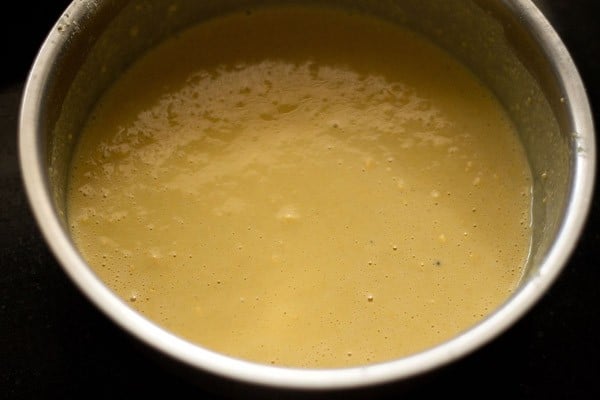
9. Dip the slightly flattened potato balls in the batter and coat it evenly with the batter.
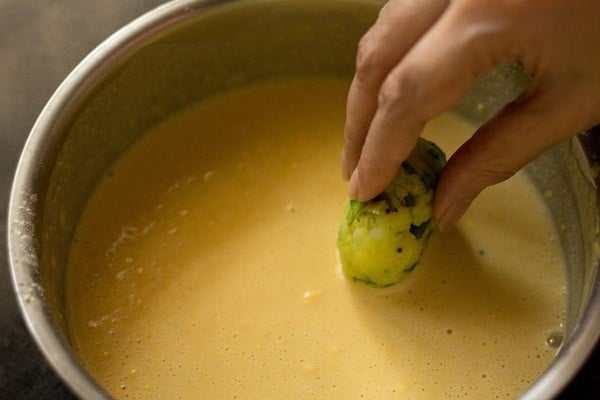
Fry Batata Vada
10. Before you dip the batata vada in the batter, heat oil in a pan or wok (kadai). When the oil becomes hot then dip the batata vada in the batter to coat as shown in the above steps.
Carefully and gently drop these batter coated potato balls in medium hot oil.
Note: You can read more details on the frying temperature in the ‘expert tips’ section below.
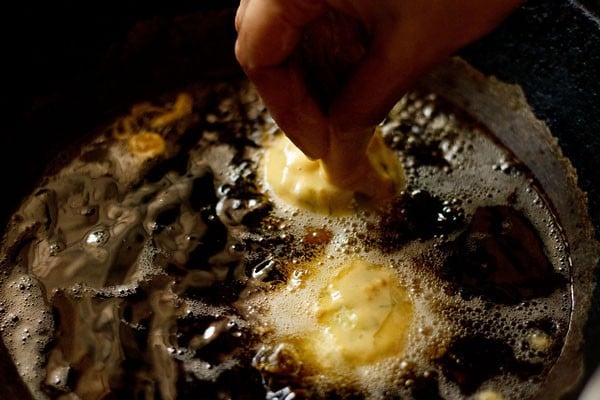
11. Depending on the size of the kadai or pan, you can add more or less of the vada while frying. But don’t overcrowd the pan
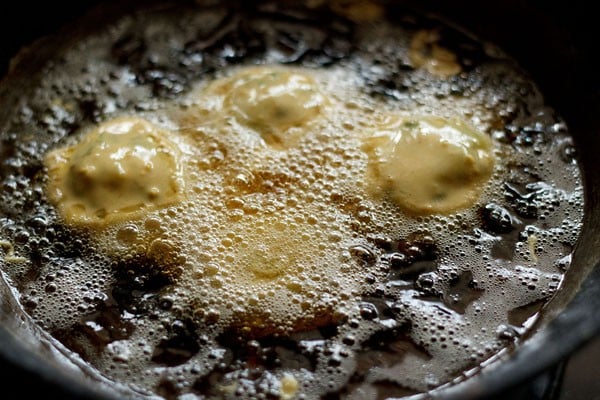
12. When one side firms up, becomes slightly crisp and golden then only turn over gently with a slotted spoon.
Fry the second side. This way deep fry them till golden, turning a couple of times as needed.
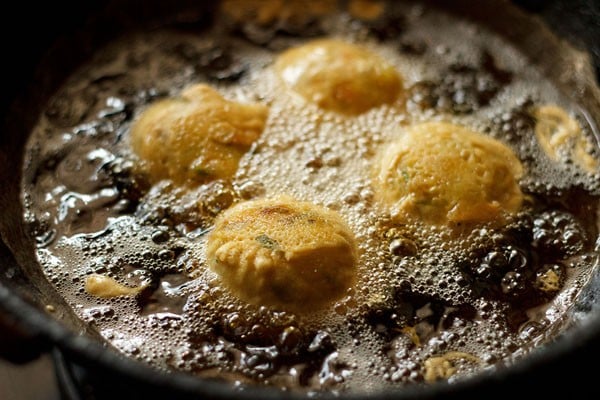
13. Place them on kitchen paper towels to absorb extra oil. Make all batata vada this way in batches and set aside.
If required, regulate the stovetop heat when frying the vadas.
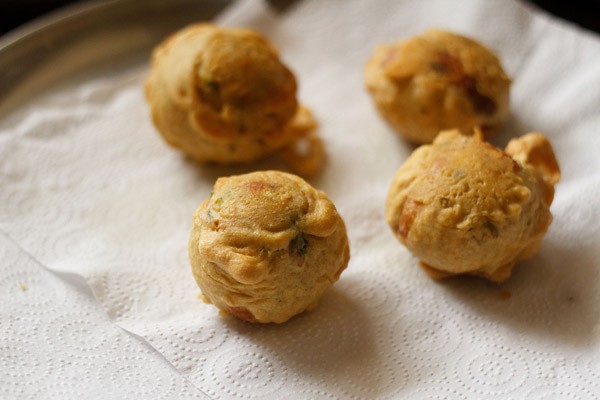
Assemble Vada Pav
14. Serve them when they are still hot or warm. Put all the chutneys and pav on your work surface. Slice the pav without breaking it into two parts and set aside.
If you don’t have sweet chutney, then make the vada pav with green chutney. The green chutney and sweet chutney recipes are mentioned in the recipe card below.
You can make these two chutney recipes some hours ahead or a day before and refrigerate.
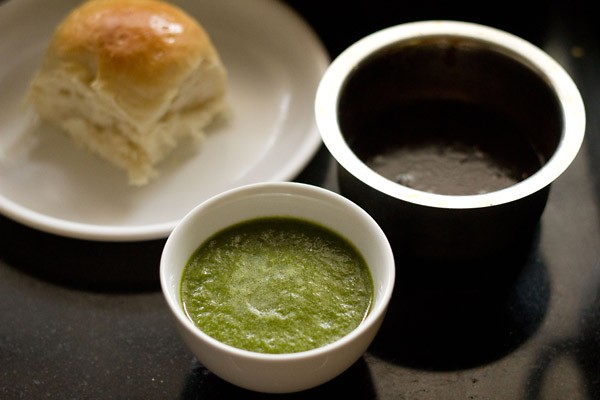
15. Spread both the green chutney and sweet chutney on the sliced pav. You can also spread green chutney on one side and sweet chutney on the other side.
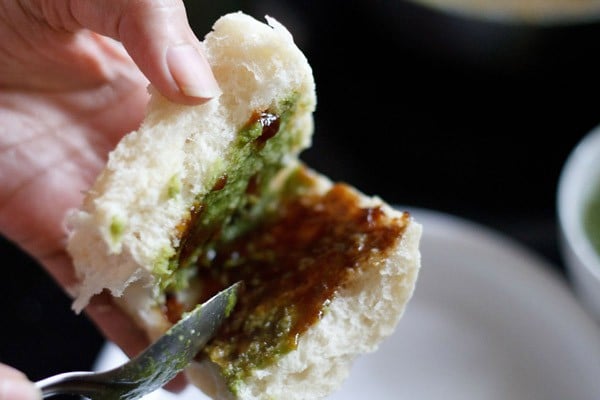
16. Sprinkle the dry garlic chutney on the pav. This step is optional and you can skip it if you don’t have garlic chutney.
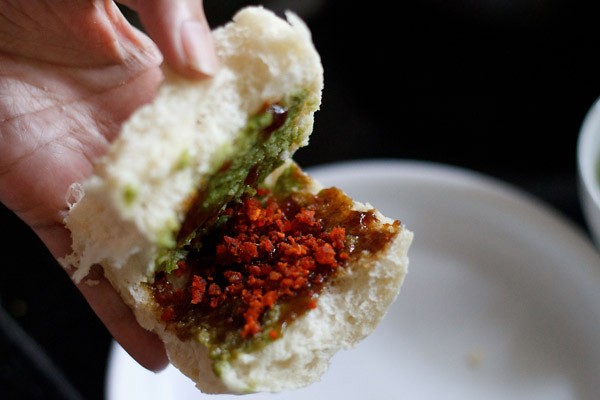
17. Place the hot batata vada in the bread slices.
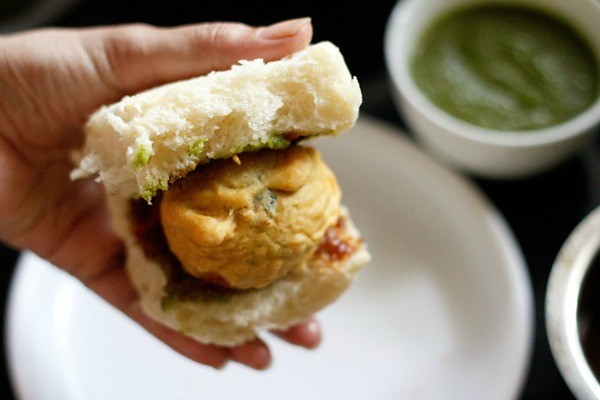
18. Serve vada pav immediately or else the pav becomes soggy. You can also serve some salted fried green chilies and both of the chutneys with it.
It makes for a good filling evening snack high on carbs. A cup of hot tea or coffee can also be served as a side beverage.
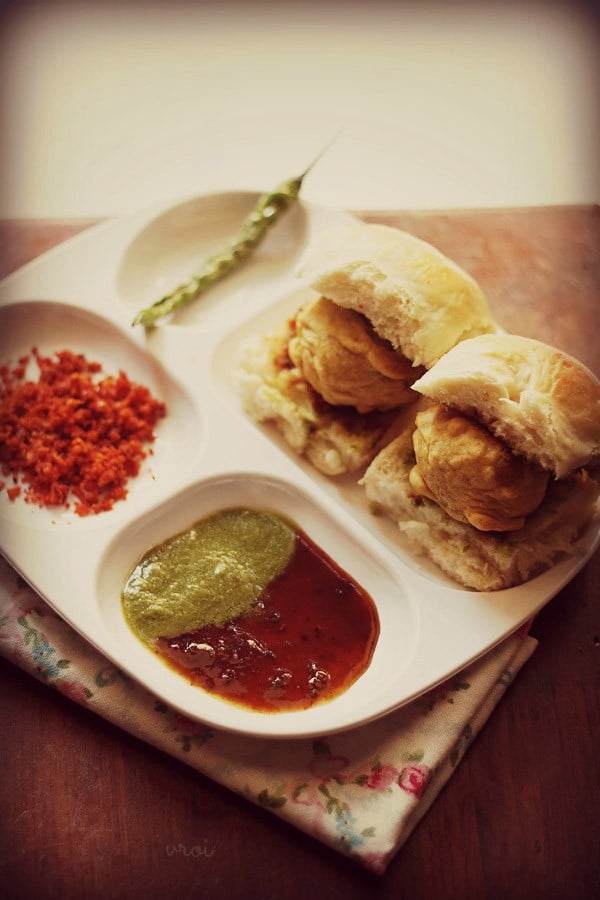
Expert Tips
- When frying batata vada the oil should be moderately hot at a temperature of 180 to 190 degrees Celsius (360 degrees to 375 degrees Fahrenheit). You can use a candy or deep-fry thermometer to check the temperature of the oil.
- Alternatively, you can add some droplets of the batter to the oil. If the droplets rise to the surface gradually and start bubbling then the oil is ready. However, if the droplets rise slowly or get submerged inside then the oil is not hot enough. If the droplets rise too quickly and get burnt or browned then the oil is too hot.
- When batata vada is fried in oil that is too hot, it remains undercooked on the inside and burnt and overcooked on the outside. Frying them in oil that is not hot enough causes them to absorb more oil and become soggy and oily.
- You can alter the amount of spices as per your taste preference. In some Maharashtrian cities like Kolhapur, the vada pav served in the street is very spicy. My recipe does not make for a spicy vada pav. If you want to make it spicy then add more green chilies.
FAQs
I have read that Vada pav was invented by Ashok Vaidya at a stall outside Dadar railway station in 1966.
You can eat vada pav with dry garlic coconut chutney, green chutney, sweet tamarind chutney, Indian chai or fried salted green chilies.
Batata vada means potato fritter in Marathi and is a combination of potato (batata) and vada. Pav comes from the Portuguese word pão which means bread.
More Delicious Mumbai Street Food Recipes
Indian Street Food Recipes
Indian Street Food Recipes
Indian Street Food Recipes
Indian Street Food Recipes
If you’ve tried this recipe, please rate it in the recipe card or leave a comment below – I’d love to hear your feedback. For more vegetarian inspiration, sign up for my email updates or follow me on Instagram, Youtube, Facebook, Pinterest or X.
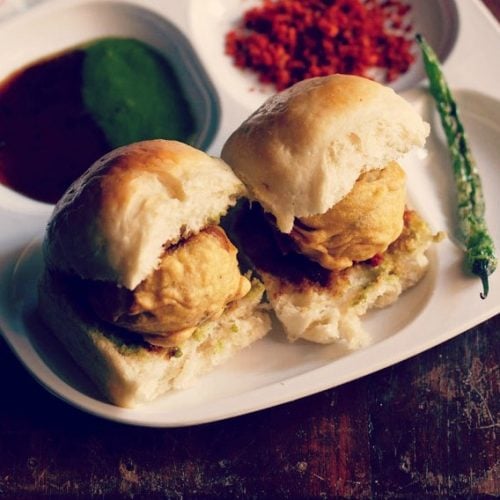
Vada Pav Recipe | How to make Mumbai Vada Pav
Ingredients
For spiced potato stuffing
- 350 grams potatoes or 2 medium to large sized potatoes
- 6 to 7 garlic – small to medium-sized
- 1 to 2 green chillies
- ½ teaspoon mustard seeds
- 1 pinch asafoetida (hing)
- ⅛ teaspoon turmeric powder
- 7 to 8 curry leaves
- 1 to 2 tablespoons chopped coriander leaves (cilantro leaves)
- salt as required
For batter
- 1 to 1.25 cups gram flour (besan)
- 1 pinch asafoetida (hing)
- ⅛ teaspoon turmeric powder
- 1 pinch baking soda – optional
- ½ cup water or add as required
- salt as required
For green chutney
- 1 cup chopped coriander leaves
- 1 to 2 garlic cloves – small to medium-sized, chopped
- 2 to 3 drops lemon juice
- 2 to 3 green chillies – chopped
- salt as required
For sweet tamarind chutney
- ½ cup seedless tamarind – tightly packed
- 1.75 cups water or add as required
- ½ teaspoon cumin seeds
- ½ teaspoon ginger powder (saunth powder)
- 1 pinch asafoetida (hing)
- ¼ teaspoon Red Chili Powder
- 7 to 8 tablespoons jaggery powder or grated jaggery – add as required adjusting to your taste
- 1 teaspoon oil
- salt or black salt, add as required
Other ingredients
- oil as required – for deep frying
- 2 tablespoons dry red chutney – optional
- 8 pav or dinner rolls
- 3 to 4 fried green chillies mixed with some salt, optional
Instructions
Making green chutney
- Grind all the green chutney ingredients with little water till smooth. Avoid making a watery chutney.
Making sweet chutney
- Soak tamarind in hot water for 30 to 40 minutes.
- With your hands, squeeze the pulp from the tamarind in the same bowl or pan. strain the pulp and keep aside.
- Heat oil in a small pan. lower the flame & add cumin seeds and let them crackle.
- Add ginger powder, red chili powder, asafoetida. Stir and add the strained tamarind pulp. Cook for 2-3 minutes.
- Add the jaggery and salt and cook for 4-5 mins more. The mixture would thicken. Let the saunth chutney mixture cool.
- When cooled, store the saunth chutney in an air-tight dry jar or container. Refrigerate and serve the saunth chutney whenever required with chaat or snacks.
Making potato stuffing
- Boil or steam potatoes in an Instant pot, pressure cooker or pan until they are completely cooked. Peel and then mash them with a fork in a bowl.
- Crush garlic and green chillies to a semi-fine paste in a mortar-pestle.
- Heat oil in a small pan. Add mustard seeds and crackle them. Then add curry leaves and asafoetida. Stir and fry for about 5 seconds.
- Then add crushed garlic and green chilies paste, which have been crushed in a mortar-pestle. Add turmeric powder. Stir for some seconds until the raw aroma of garlic goes away. Do not brown garlic.
- Pour this tempering in the mashed potatoes.
- Add chopped coriander leaves and salt.
- Mix everything well and then make small to medium balls from the mashed potato mixture. Flatten these balls a bit. Cover and set aside.
Making batter
- In another bowl, make a smooth and thick yet flowing batter from the besan, turmeric powder, asafoetida, a pinch of baking soda (optional), salt and water.
- The batter should not be very thick or thin. If the batter becomes thin, add 1 or 2 tablespoons of gram flour. If the batter becomes thin, then add 1 or 2 tablespoons water. Set aside.
Frying
- In a kadai or pan, heat oil for deep frying.
- When the oil becomes medium hot, then dip the slightly flattened potato balls in the batter and coat it evenly with the batter.
- Gently and carefully add these batter coated potato balls in medium hot oil.
- Depending on the size of the kadai or pan, you can add more or less of the vadas while frying. Don't overcrowd the pan while frying.
- When one side becomes crisp, lightly golden and firms up then gently turn it over with a slotted spoon and fry the second side. Turn over when the second side is fried.
- This way turning a couple of times fry the batata vada till they are evenly golden on all sides.
- Drain them on kitchen paper towels. Make all batata vadas this way and keep aside.
- When they are still hot or warm, you need to serve them. Take all the chutneys and pav on your work surface.
Assembling & serving
- Slice the pav without breaking it into two parts and keep aside. If you don’t have sweet chutney, then just make the vada pav with green chutney.
- Spread both the green chutney and sweet chutney on the sliced pav. You can also spread green chutney on one side and sweet chutney on the other side.
- Sprinkle the dry garlic chutney. This is optional and if you don’t have you can skip it.
- Place the hot batata vada sandwiched in the bread slices.
- Serve vada pav immediately or else the pav becomes soggy. You can also serve some fried salted green chillies and both the chutney along with it.
- You can also serve them as an evening snack with a side of ginger chai or coffee.
Notes
- You can always alter the amount of chutneys you spread in the pav according to your taste and liking.
- The oil has to be medium hot when you fry the batata vada. If the oil is very hot then the outside batter will get browned and leaving the inside portion of the batter uncooked. On the other hand, if the oil is not hot enough then the batata vada will absorb a lot of oil making it soggy and loaded with oil.
- To make a spicy vada pav, increase the number of chilies in the potato stuffing. Or you can more chilies in the green chutney that you make.
- This recipe can be scaled to make a big batch for a party or get togethers.
Nutrition Info (Approximate Values)
This Vada Pav recipe post from the blog archives first published on August 2009. It has been updated on January 2024.
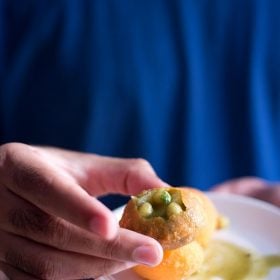
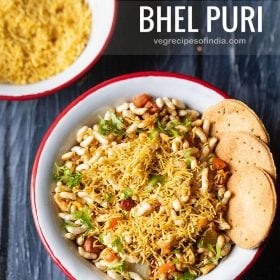
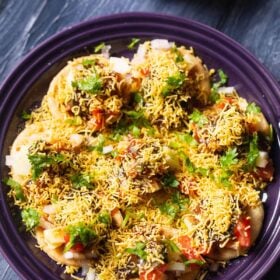
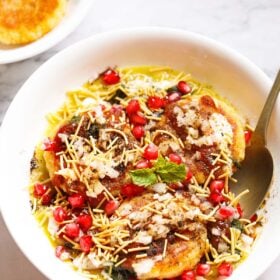
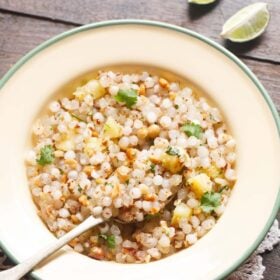
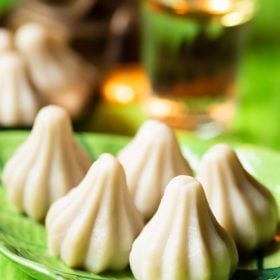
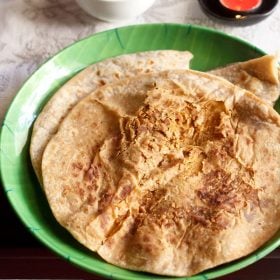








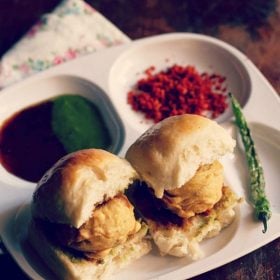
I am a fan of your recipes; they are as you showcase them and the results are fabulous. I have made a many of them but Dal Makhani with dhungar is all time favorite and Vada Pav of course. Love you Dassana Amit.
Thanks a lot Dr Namita. Glad that you like both these recipes. They are a favorite with us too.
Came out yumm!
Love all your recipes, always a hit once you make them, love the way you show it in easy steps. Made vada pav, all loved it. God bless you.
Thanks a lot and glad to read your lovely feedback.
Good!
Awesome recipe, so simple to follow. I just have one doubt. If I prepare the vada few hours before serving then how do I reheat it?
Thank you. The vada taste best when it is hot. I would recommend to make them when you plan to serve them. On cooling the texture and the taste will change slightly. Of course you can reheat in an oven, but a piping hot vada in a pav with the assorted chutneys is an experience to relish.
I like your all recipes, it really amazing, mouth watering !!
Thanks a lot Vijeta.
Love your recipes
Thanks Sheetal
thanks
welcome kuldeep
hello amit
i hv been following your recipes since a few months..and i must tell u that i feel really happy when they turn out well..the detailed images help us to understand the textures and to what extent a particular ingredient should be cooked..it is very helpful ..it would be great if you can tell me the ingredients (in grams measurements) vada paav for 12 servings ..
thanks in advance ..
Thanks Shobhita. Glad to know this. You can easily triple this vada pav recipe.
U r simply awsome ????too good ???? I have tried many of ur recipe n it has turned out really well, thank u so much, now anybody name any recipe n I have it all ready to make ???? n it’s really good no confusion at all, step by step, photo by photo, it’s all there, u just have to try, n really speaking I was so so dam bad at cooking ???? bcoz nothing encouraged me so much, now with this app I just go on n on making n trying different recipes ???? all thanks to u yaar, u really made my life ????
thanks a lot akanksha. nice to read your comment and it does motivate me to add more recipes. thanks again and happy cooking.
Ma’am do you have the recipe of goli wada pav? I have been searching it but can’t find on any of the blog and i don’t want to go for any other blog because i like your recipes a lot. Please let me know if you have the recipe of goli wada pav. Thank you.
Welcome Ashwarya. Nice to know that you like the recipes from this blog. I don’t have the recipe of goli wada pav.
Okay ma’m its alright no worries. Thanks for replying.
welcome ashwarya.
I have been following your blog for more than a year now but never commented or left a review. But it’s high time i thank you for all your recipes. Almost all recipes that I tried from your blog were a success. I learned how to bake paav from your blog only and since then not buying paav from outside. Also this vada has an authentic maharashtrian taste which I love. Thank u and pls keep posting such awesome recipes ?
Welcome Radina. Thanks for your appreciation and positive feedback on vada pav recipe.
This is the real Kandivali/Andheri Vada Pav. Many thanks for posting this. It came out awesome. On a side note, if you have ever passed thru Johannesburg airport, please let me know. I have a recipe question.
thanks prashant 🙂 for the positive feedback. we have never gone near johannesburg airport but you could still send a recipe request.
There is a restaurant called the ‘Raj Indian Cuisine’ at Johannesburg airport. I believe it is part of a chain of restaurants. They serve a veggie wrap which is awesome and unique. In all my travels I have not come across this flavor ever before. I’m hoping someone knows how to make it.
fine. there are so many ways a veggie wrap is made. you can ask them on how they make it. most of the times the chefs tell you the recipe or method. i have got requests for a veggie wrap, but more like the mc donald type. so will try to add this recipe. not sure if i am able to make mc donald type but will be a good veggie wrap recipe.
Someone is copying your content. I tried to put the comment with the link but it is not possible.
shriharsha, the comment was in moderation.
Hi dasanna,
I am a regular follower of your blog and few other blogs too. I recently came across this new blog, who is copying part of your content from many recipes. Some in part and some recipes almost full. So this vada pav is one such example. They will copy either the introduction part or ingredients list or the description. But they are clever enough to edit the content and change the images. They are doing good job otherwise but this short cut is not acceptable. Please take some action.
The link is: https://hebbarskitchen.com/vada-pav-recipe-mumbai-vada-pav-recipe/
thanks shriharsha for sharing this info. i don’t know what to do. there are many sites, some well known too who are copying like this. if i follow the process of removing the content from such site then i lose lot of time. so mostly i choose my time to share recipes and create more content than to deal with people who copy recipes and photos without permission. this is the case with many hard working food bloggers.
Hats off to your positive spirit!! God bless you.
thankyou so much shriharsha god bless you too!